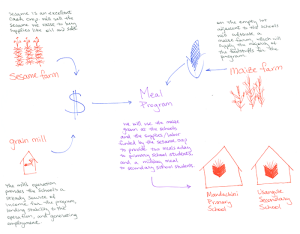Usangule Food For Thought is a non-profit organization growing a self-sustaining meal program for primary and secondary school students in Usangule, a village in rural Tanzania.
The program consists of two phases: the maize plot and mill, and the sesame farm. First, we worked to raise money to fund an initial crop of maize to start the meal program at the primary and secondary schools in the village, and bought a mill to run as a small business to raise money to fund the maize. Then we planned to start a sesame plot to be sold as a cash crop, at which point the program would be self-sustaining, and provide additional income for infrastructure development, educational enrichment, and scholarships. Moreover, the meal program would provide an incentive for parents to educate all of their children – both the boys and the girls – and would greatly improve the quality of their health and education.

My friend, Ali Arams, founded the non-profit while she was living in Usangule, where she worked for a year teaching at the schools. She helped organize a board of leaders in the village to run the program on the Tanzania side once she moved back to the states to get her Masters in Education at CU Boulder.
Part of the founding board from July 2013 to August 2014, as Director of Web Development, I was responsible for the initial logo and style guide, graphic design elements to unify presence on social media, setting up a donation-enabled website, ufft.org emails, and an asana instance to coordinate the cross-continent collaboration of all the founding members.

Initial Versions of Facebook Page Banners

I was also actively involved in all other aspects of the non-profit, especially the planning and fundraising. We went through the process of legally incorporating in California, and I learned about how land ownership works in Tanzania.
Overall, this was a great learning experience, and I am so happy to report that the program has gone through two years of phase one, and this year the children started eating and attendance has expanded immensely at the school.
